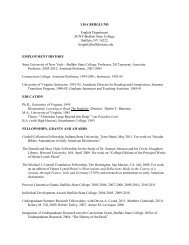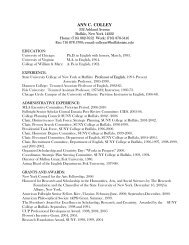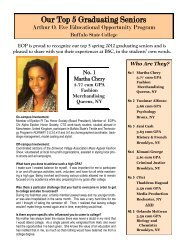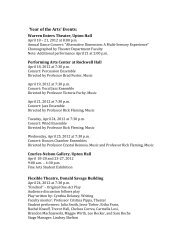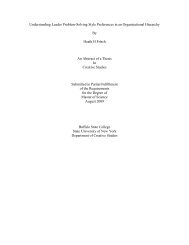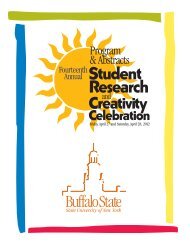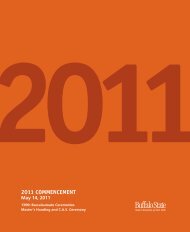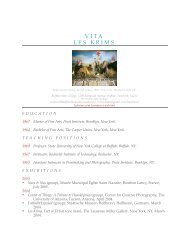POLITICS VERSUS SCIENCE: APPORTIONING ... - Buffalo State
POLITICS VERSUS SCIENCE: APPORTIONING ... - Buffalo State
POLITICS VERSUS SCIENCE: APPORTIONING ... - Buffalo State
You also want an ePaper? Increase the reach of your titles
YUMPU automatically turns print PDFs into web optimized ePapers that Google loves.
To our second question—to what extent might institutional and split competencies<br />
either enhance or diminish the effectiveness and legitimacy of food safety regulation—<br />
we cannot offer a definitive answer. We can, however, suggest possible outcomes, one<br />
positive and exciting, the other troubling.<br />
Scientists, more than any other identifiable professionals, engage in the necessary<br />
socialization and communication behavior needed to build and maintain policy networks.<br />
In our review of the literature focusing on the sociology of science, we learned that<br />
science is guided by a set of shared values ant that scientists form communities—<br />
invisible colleges—in which they maintain constant communication of ideas (hunches<br />
and discoveries) through complex and redundant communication fora and networks —<br />
listservs, computer groupware, professional conferences and workshops, journals, and<br />
exchanges to research institutes. Key scientists occupy central roles, training “apprentice<br />
disciples” 27 who fill academic and government posts throughout Europe. The EFSA<br />
takes positive advantage of these networks. To this we might add Majone’s (1997, 274)<br />
observation that, "As the shortcomings of command-and-control regulation are revealed<br />
by a growing body of empirical evidence, the virtues of regulation by information are<br />
being recognized by policy-makers everywhere." The Commission has assumed the role<br />
of translating knowledge into policy by making itself the main client of an informational<br />
agency staffed by scientists and public health authorities (EFSA 2003).<br />
Yet the arguments against regulation through policy networks and for an<br />
independent regulatory agency seem equally persuasive, no less so because it is scientists<br />
(James et al. 1999) as experienced regulators who advocated this institutional structure.<br />
Disease has been identified as a causal factor in the centralization of government<br />
27 Price called them “sorcerers’ apprentices.”<br />
32




